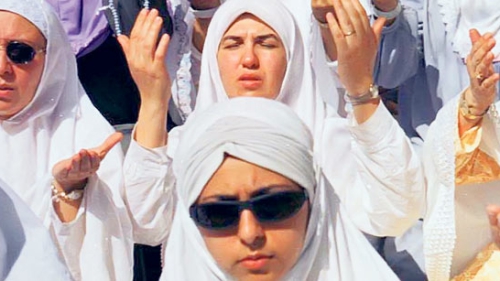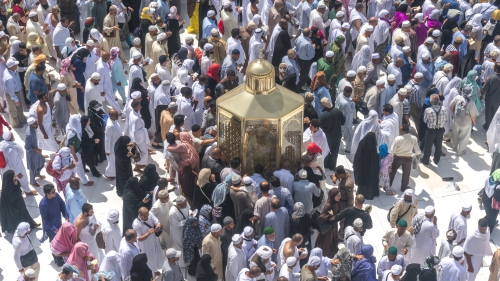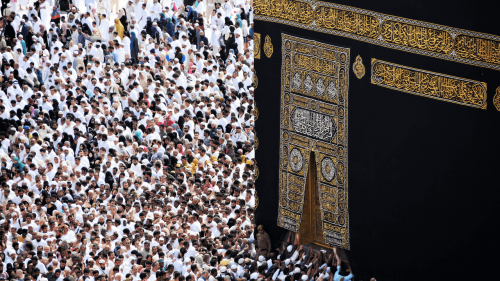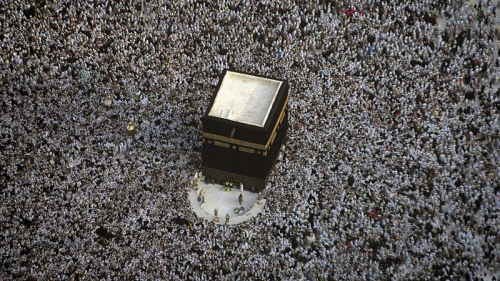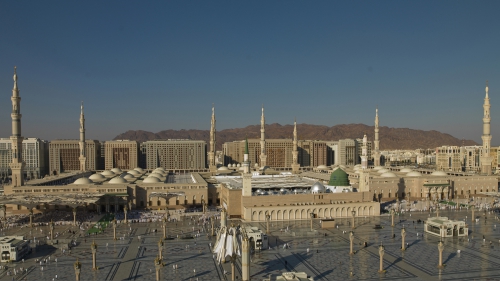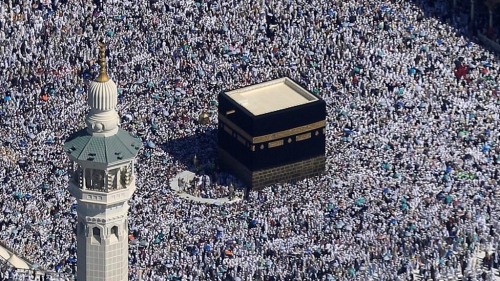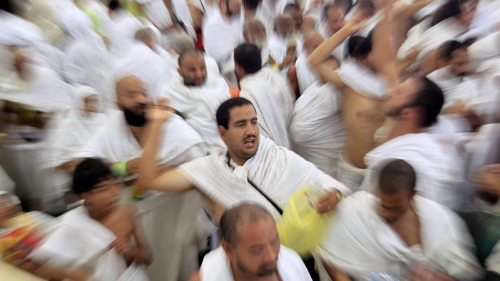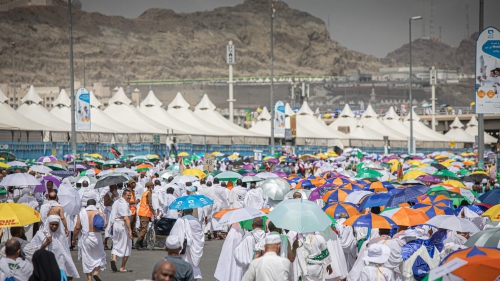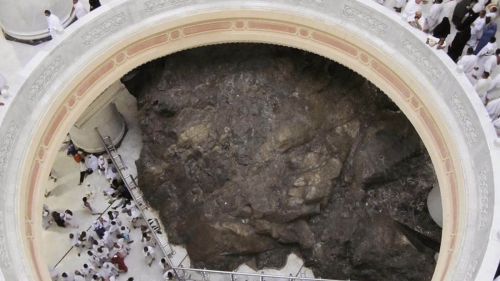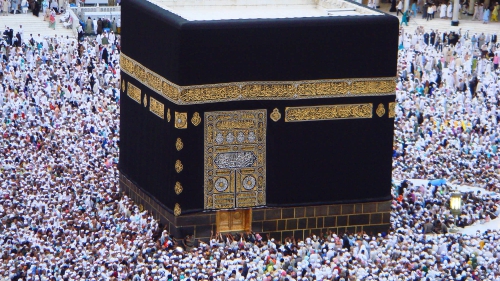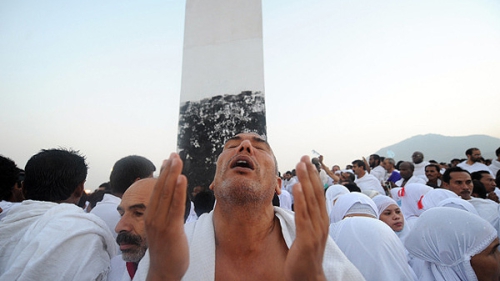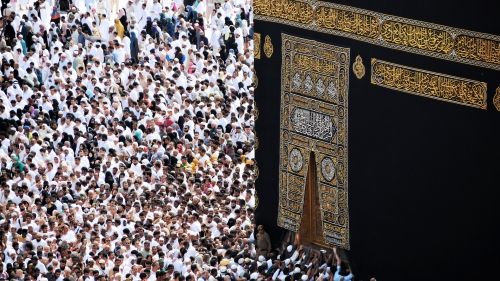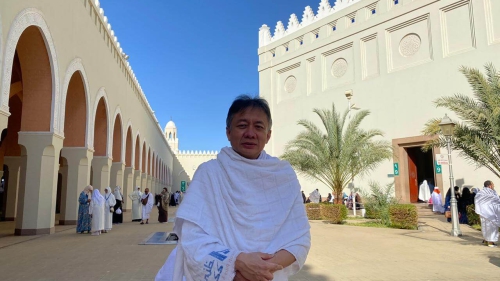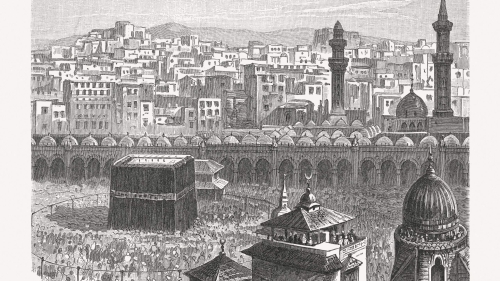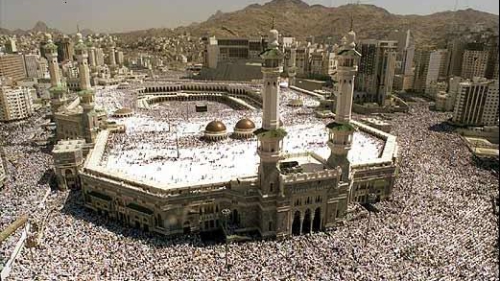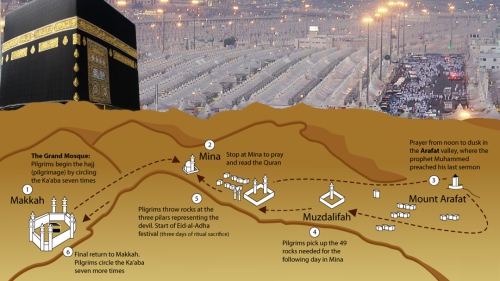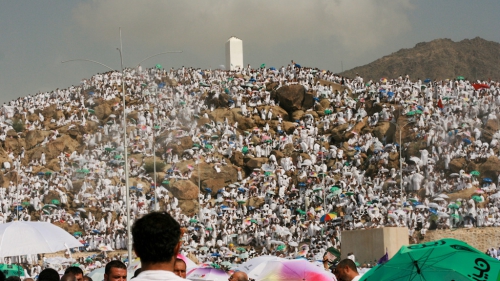Hajj: Going Beyond the Rituals
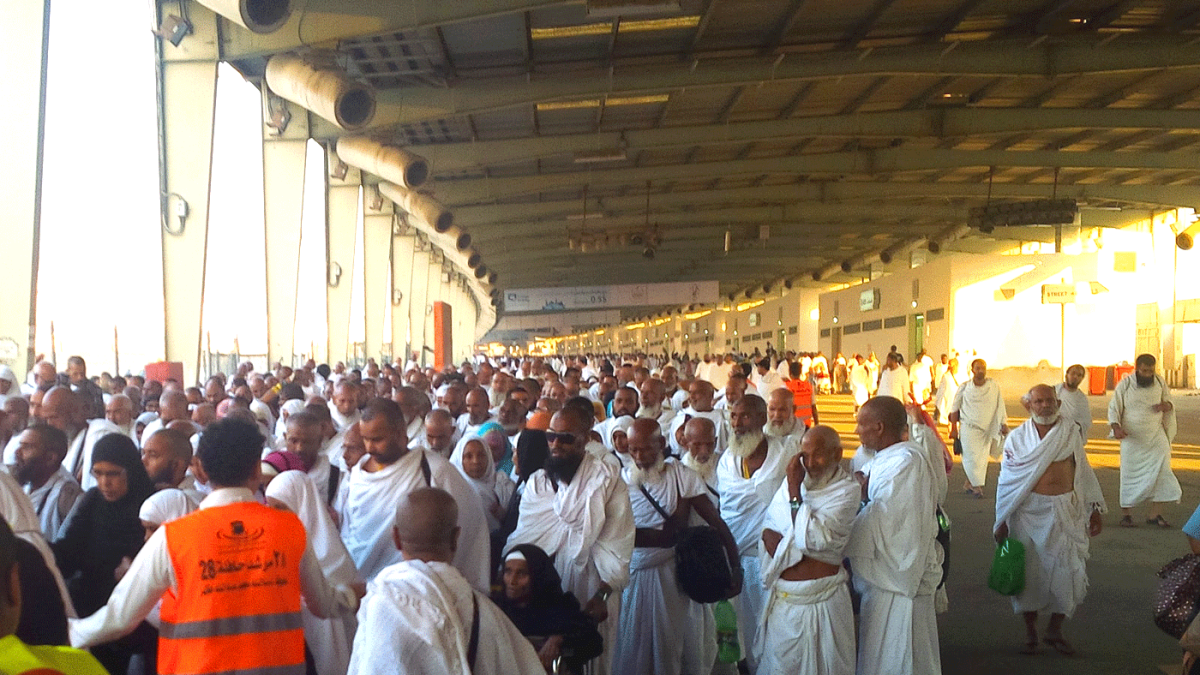
The proceeding verses and ahadeeth describe the tremendous blessings and remarkable rewards Allah bestows upon those who answer His call to perform Hajj and offer it the way it should be offered-a Hajj mabroor-an accepted Hajj.
Some might say: "Why does Hajj, which is obligatory only once in one's lifetime, occupy such a supreme rank among the rituals of Islam?" Posing this question does not imply rejection of Allah's blessings. Rather, it stems from the desire to know the reasons behind Hajj's consequential status, in order to make this knowledge a motivation to perform Hajj and do it in the best way possible.
Lets us begin by considering the hadeeth quoted in the beginning of this writing, which entails that Hajj comprises the following four elements:
- First, the worship referred to in the hadeeth is Hajj,
- Second, the aim of Hajj is seeking Allah's pleasure by way of utter sincerity, a condition necessary for the validity of all acts of worship,
- Third, the invalidators of Hajj are engaging in sexual acts and committing serious disobedience, and
- Fourth, the reward for Hajj is forgiveness of all sins.
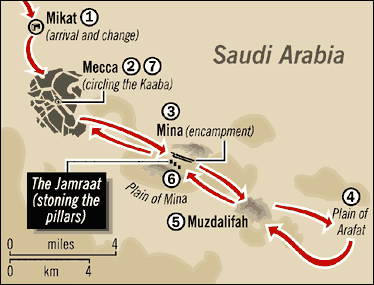
("a stated place" before entering Makkah).
2. Circling the Ka'bah. 3. Stay in Mina.
4. Stay in Arafat. 5. Sleep overnight in
Muzdalifah. 6. Stoning the pillars. 7. Go back
to Makkah, circling the Ka'bah.
What is Hajj?
Lexically, 'hajj' in Arabic denotes having intention to do something or achieve a goal. It also means a journey or search, especially one of exalted purpose. In the legal sense, Hajj refers to pilgrimage to the House of Allah, the Ka'bah, in a specific bodily and mental state, and within a specific time frame to perform specific rituals. As such, Hajj is a broad and extensive form of worship that requires one to put together and manage his financial, physical, mental and emotional resources for an extended period of time in which one has to perform a large number of deeds of varying religious weights-prerequisites, obligatory and recommended acts-which require of one a reasonable knowledge of what, how, and where to do each one of these particular acts. Those who have been to Hajj or studied it attest to how intricate performing Hajj can be.
Yet, performing the Hajj rituals in accordance with the Shari'ah is not of much concern in the discussions that follow. Instead, our focus will be the other aspects of Hajj, alluded to in the aforementioned verses and ahadeeth. We seek to shed light on some of the significant concepts and meanings Hajj epitomizes, meanings to which many pilgrims are, unfortunately, either oblivious or indifferent, a fact succinctly depicted in the story of the man who remarked out loud as he saw the massive crowds of pilgrims sweeping through the valley of Muzdalifah: "My God! Look at the number of pilgrims!" A wise man who happened to be standing beside him replied: "No. The passengers are many, but the pilgrims are few."
On the face of it, Hajj rituals may seem to be mostly physical and financial in nature, but when we deeply consider what is being carried out, in any of Hajj's various stages, we realize that it is these other meanings and objectives (so-called maqasid or ultimate goals and intents of Shari'ah) that are being emphasized to the pilgrims, not the rituals themselves. It is true such maqasid as well as the spiritual dimension are essential to all types of worship in Islam, but the variety of the acts forming Hajj worship and the magnitude of the maqasid and the meanings implicit in them are of a far more impressive measure-and so too their spiritual impact-than any other Islamic form of worship. Here is a brief discussion of some of these maqasid.
The Maqasid of Hajj: Going Beyond the Rituals
Ihram: The Return to Origin
Ihram is the first pillar of Hajj and probably the most powerful form of Islamic worship a Muslim can ever experience. It is a time when one consciously declares intention to begin the Hajj rites. Thus Ihram is an act through which the pilgrim acknowledges the sacredness and reverence of the worship of Hajj, God's House (Ka'bah) and the Sanctuary (Haram) surrounding it, which one does by not passing the miqat way mark, which establishes the worshipful precincts of the Ka'bah without being in the state of Ihram. All pilgrims of all social, racial and economic backgrounds remove all apparent signs of their differences by donning the same two pieces of simple, white cloth. Moreover, every pilgrim declares the same intention and utters the same words of submission to Allah, the One God, known as the talbiyah. Each one asserts out loud: "Labbaika allahumma labbaik" Ever at jour service, O Allah! Ever at your service! This they proclaim in response to Allah's Call pronounced by Abraham, alayhes salam, to humankind to submit to Allah and come in pilgrimage to Allah's House and Sacred place.
Every pilgrim is to avoid all that is not of concern to one, give up many desires, permitted and prohibited, diminish all causes of division and schism, magnify equality and fairness, and sanctify life and the rights of others, Muslims and non-Muslims. These are some of the main dimensions the acts of Ihram seek to emphasize. In this sense, Ihram not only symbolizes but helps pilgrims actually embody a return to fitrah, the original state of goodness: Loving God, loathing all that He forbade, and being in a state of submission to His Commandments and Will.
Emigrating to Allah
One may look at Hajj as a physical-spiritual journey to God, because in essence, a pilgrim parts with his loved ones, wealth, and work and heads to the Sacred Places hoping for Allah's reward and forgiveness. Hajj is also a way of commitment in which one demonstrates one's determination to free oneself from wrong and bad, and to engage life afresh in a new existence, as it were, centered on Allah's love and obedience. Indeed, Hajj, as one Muslim sage has so aptly stated it, is "a long journey, but of returning, not going. The pilgrim is not going to Makkah. He is returning to his source, Allah, the Source of Everything."
Another way of understanding this statement is possible if we realize that Hajj's ultimate benefit and impact is in the return home-the lightness that every pilgrim feels and the happiness that overtakes one at the moment of finishing all the rites and getting prepared to go back to family and loved ones. In this sense and for this reason, the scholars put much emphasize on what happens after Hajj and how a pilgrim handles his relationship with Allah thereafter.
Muslims go to Hajj in response to Allah's call to them, through Prophet Abraham, to immigrate (physically and spiritually) to His House. Allah says: "And proclaim among people the Pilgrimage. They will come to you on foot and (mounted) on every kind of lean beast, coming from every remote path" [22:27]. Answering Allah's call, Muslims emerge from every corner of the world, "fleeing" to Allah, turning to Him and taking refuge in Him from disbelief and disobedience, thereby escaping His punishment-a concept which the Qur'an refers to as fleeing (evil as well as anything that takes one away from leading a pious life): .. .so flee to Allah, indeed, I am a great Warner to you (from Him)..." [51:50].
Unfortunately, the idea of "fleeing" or separation from sin, which Hajj deeply implies in its rituals, escapes the minds of many pilgrims. If a pilgrim really grasps the immigration concept implicit in the acts of Hajj, he or she will distance him- or herself from disobedience like the east is from the west. For the hadeeth has is it that ". ..indeed, the true immigrant is one who 'immigrates' from sin" (Ibn Hibban).Thus, missing out on this great concept of separation that the Hajj implies prevents one from achieving the optimal benefits and possibilities embedded in this incredible act of worship. Pilgrims must keep this in mind.
Self-Struggle Creates Motivation
Hajj motivates one to struggle in the path of Allah, bolsters one's ability to see it through, and creates willingness in one to take obedience of Allah to the next level. While in Hajj, a Muslim is to endure, graciously, all the difficulties the trip to the Sacred Places involves to please his Lord. And since that entails a lot of patience and steadfastness, the Hajj was described by the Prophet, sal-lallahu alayhe wa sallam, as an act of jihad, "...the jihad of the old, the weak, and women is Hajj and Umrah" (Targeeb and Tarheeb).
Moreover, Allah guarantees full reward for the pilgrim. The Prophet, sallallahu alayhe wa sallam, said: "Three people are guaranteed full reward by Allah: one who steps out of his home heading for the masjid; one who goes out in an expedition to propagate or defend Allah's word; and one who goes for Hajj" (Ahmad). The tazkiyah one is to gain from this struggle with his or herself and this guarantee from the Lord of the Worlds are great motivations for Muslims to take Hajj seriously and expect a major enrichment in their relationship with Allah upon returning from it.
The Goal is Unity
Muslims, from Adam, alayhes salam, to the end of time, belong to a single brotherhood (ummah). They are bound together by the concept of Tawheed (Monotheism). In Hajj, this concept of Tawheed-based solidarity is translated into deeds as Muslims from a wide range of backgrounds stand united in one place, worshipping one god, undivided by race, color, language or nationality. The Qur'an taught in many verses that all human beings descend from a single ancestor, that none has an intrinsic right of superiority over another, whatever one's race, nation, or social standing.
Also, this concept of unity and equality is highlighted in many ahadeeth, like the one narrated by Jabir who reported that the Prophet, sallallahu alayhe wa sallam, addressed his followers on the second day of the Days of Tashreeq (that is, the days of where the meat one has sacrificed is dried, the 11th, 12th, and 13th of the month of Thul Hijjah). He said: "O people! Indeed, you have one Lord (Allah) and one father (Adam). No Arab is superior to a non-Arab, or a non-Arab to an Arab; and no white is superior to a non-white or a non-white to a white. Superiority is by righteousness and conscious fear of God in piety [alone]. " Then the Prophet asked: "Did I convey the Divine message to you?" "Yes, indeed, O Messenger of Allah!" answered the mass of pilgrims. "Then let those who are here today convey my words to those who are not," concluded the Prophet, sallallahu alayhe wa sallam (Ahmad and Baihaqi).
We will definitely miss the gist of our Prophet's preaching about the oneness, equality, and brotherliness of all Muslims if we discriminate against one another; if, in our dealings with one another, we allow ourselves to be swayed by considerations of ethnicity, social standing, or national backgrounds; or if we cut ourselves off from the ummah, become cocooned in the den of our personal concerns and wallow in stoicism and indifference when all sorts of sufferings, injustices, and aggressions are heaped on the heads of our Muslim brothers and sisters, and of so many of our fellows in humanity.
Submitting to Allah: Going All the Way
A Muslim is by definition one that honors the deen of Allah and places it before anything else. He or she never allows contradicting human-contrived views to take precedence over Allah's divine commands. A Muslim sees the Shari'ah as infallible; accepts and submits to all of its dictations even when it is hard to grasp the Divine wisdom in them. Even though most of the Shari'ah is understood and its rationality may be appreciated, there are certain aspects of it (matters of strict rituals) that are intended to be less clearer-with at least one of their purposes being to differentiate those who believe from those who don't. If something is factually established as part of the Shari'ah, it should be glorified and applied.
This position is so clearly reflected throughout the rituals of Hajj, but more explicitly, in the act of kissing al-Hajar al-Aswad (The so-called Black Stone). As we know, the Black Stone is just a stone and is incapable of benefiting or harming anyone. But because die Messenger of Allah, sallallahu alayhe wa sallam, used to kiss it whenever he circled the Ka'bah, Muslims follow faithfully and kiss it too. This understanding is best illustrated by the statement of Caliph Umar ibnul Khattab who said, addressing the Black Stone: "By Allah! I know that you arc just a stone that is incapable of either benefiting or harming anyone. Thus had I not seen the Prophet, sallallahu alayhe wa sallam, kiss you, I would not have kissed you" (Bukhari). Commenting on Umar's statement, Ibn Hajar said in his Fat-hul Bari: "Umar's statement and action with regard to the ritual of kissing die Black Stone is a guiding principle in the issue of following the Prophet's legal commands, even when their rationale escapes our understanding." A major part of the intent of this kind of ritual in Islam is to indicate and establish the meaning and extent of submission or tasleem in being a Muslim.
Parting Ways with Polytheists
A standard feature of Islam that is very clearly and unquestionably demonstrated in the Qur'an and the Sunnah is the obligation that Muslims should part ways with polytheists. Allah says: "There has already been for you an excellent pattern in Abraham and those with him, when they said to their people: "Indeed, we are disassociated from you and from whatever you worship other than Allah. We have denied you, and there has appeared between us and you animosity and hatred forever until you believe in Allah alone" [60:04].
The Hajj rituals display and consolidate this notion of Muslims' disassociation from concepts, practices, and ways of disbelievers. We learn from seerah the biographical accounts of the Prophet's life, sallallahu alayhe wa sallam, that the actions of the Prophet, sallallahu alayhe wa sallam, in Arafah and Muzdalifah, as well as his attitude, were dissimilar from those of the polytheists in these two places in the Pre-Islamic era. He explained, sallallahu alayhe wa sallam, the reasons for his act by saying: "Our teachings are dissimilar from those of the polytheists and idols worshippers" (Musnad of ash-Shafi'i). It is indeed a significant lesson concerning the Muslim's attitude toward the actions, attitudes, and rituals of polytheists and idol worshippers. Anyone who emulates the polytheists and adopts their ethics, conduct, appearance, or lifestyle has indeed failed to appreciate the Prophet's teachings in this regard, sallallahu alayhe wa sallam.
Humility Before Allah
Modesty, not inspired by fear or inferiority complex, is a preeminent component in the Muslim's character. That is so because the Shari'ah loathes arrogance, condemns the arrogant, and warns them of awful consequences on the Day of Recompense as shown in the hadeeth : "Paradise is out of reach of anyone with a grain of arrogance in his heart" (Muslim). Pilgrims in Hajj, especially on the Day of Arafah, the central event of the pilgrimage, appear so like one another that all seem brothers. The cloth-covered, disheveled throng reflects the equality of all pilgrims in the eyes of Allah, symbolizing the idea that there is no real difference between a prince and a pauper when everyone is dressed equally.
All pilgrims stand together invoking and glorifying Allah. They have one powerful goal and firm focus in mind: To plead to the Almighty to forgive their sins and to bless them with The Straight Path for the remainder of their lives. Their total immersion in the imposing ambience of Hajj, frees them to focus on perfecting their Hajj instead of obsessing about superficial considerations and concerns. The Prophet's utterance of talbiyah (saying 'labaik allahummah labaik') reflects this atmosphere of modesty and humbleness before Allah. Anas narrated that Prophet Muhammad, sallallahu alayhe wa sallam, used to say in his talbiyah invocation, "Here I am, ever at Your service, O Lord! Here I am offering Hajj in sincerity and true servitude" (Musnad of Al-Bazzar).
Purifying the Soul
Muslims are obligated to tend to and take good care of their souls by purifying and ridding them of abominable qualities like miserliness and selfishness, to name only two. They are urged to give the poor their due from the sadaqah, or charity offering, and are promised an abundant reward for doing so. And even though going to Hajj is a major financial burden and Hajj's goals seem to be focusing on matters far from charitable giving, the Sunnah encourages the pilgrims to give sadaqah as much as they can. And because pilgrims, particularly indigent ones, are often in need of provisions like food and water, Allah urges the visitors of His House to be liberal with their food (i.e., nusuk or sacrificial animals): " ...So eat of them and feed the miserable and poor" [22:28] He teaches them that that will help them acquire taqwa (God-consciousness), which is the ultimate and real purpose behind the act of spending for Allah's sake: "Their meat will not reach Allah, nor will their blood, but what reaches Him is piety from you..." [22:37] The Prophet, sallallahu alayhe wa sallam, stressed the significance of sadaqah especially during Hajj, by saying, "The reward for a sadaqah given in Hajj excels seven hundred times the reward for a sadaqah given in a different setting." (Ahmad and Tabarani) Giving in charity is essential to tazkiyah or purifying one's soul and it is more so when the giving is done at a time of need and when financial burden is heaviest but if one is to gain more control on himself and loosen the grip of materialism on it, giving sadaqah in Hajj is an effective and major step toward that.
This-Worldly and Otherworldly Benefits
Muslims view the material world (dunya) as a bridge to the Hereafter. A Muslim needs dunya and employs it to achieve his legitimate this-worldly and otherworldly goals. To that effect, a Muslim does not renounce, disdain or withdraw from this world. Rather, he partakes of it, harnesses and uses it, and stewards it but never allows it to overpower or tyrannize him. And despite die fact that Hajj is an act of worship that is exclusively performed to attain Allah's pleasure, Muslims are not discouraged nor proscribed from pursuing worldly benefits during Hajj, provided that they are making Hajj solely to fulfill their responsibility for God's sake. The Qur'an declares: "There is no blame on you if you should seek something of the bounty of your Lord during Hajj (by trading or else wise). But beware that you should not be over-occupied with trading to neglect any of its rituals). But when you depart from Arafat, remember Allah at al-Mash'ari al-Haram. And remember Him, as he has guided you, for indeed, before this you were among those astray" [2:198]. Allah also says in this regard: "That they may witness [i.e., attend] benefits for themselves..." [22:28]. Commenting on this verse, the renowned commentator Ibn Katheer said: "The benefits referred to in the verse signifies otherworldly benefits that are pleasing to Allah, as well as other material benefits like business and trade."
Perfection and Completion of Religion
As the Prophet, sallallahu alayhe wa sallam, was standing with Muslims on Mount Arafah in the last Hajj he ever performed (10 A.H.), the following verse was revealed to him: "... This day 1 have perfected for you your religion and completed my favor upon you and have approved for you Islam as religion" [5:3]. Allah has made Islam a universal message, ordained it as the religion for the whole of humankind, given it the status of the last Divine Message for humanity, and meant it to be a valid guide for all humankind in all their affairs until the end of time. There is no wonder -then that the standing of Muslims on Mount Arafah keeps the memory of this extraordinary bounty (religion perfection and completion) alive in their minds and hearts. It motivates them to reaffirm their pledge to serve Allah, the Almighty. It fills them with utmost assurance and confidence that with the Qur'an and the hadeeth of the Prophet, sallallahu alayhe wa sallam, in their hands, they need not look Eastward or Westward in search of philosophies, ideologies, or laws to guide their material or spiritual life.
A Lifetime Opportunity
Ibadah or acts of worship differ as to how many times a Muslim is required to do them. Some ibadat are required once a year, like the fasting of the month of Ramadhan; some are due once a week such as Salatul Jumuah (Friday Salah); others are demanded on a daily basis such as the five daily salahs; and some are mandatory once in a lifetime such as Hajj.
One might ask though: Why has Hajj been made obligatory only once in a lifetime? Is it because of Allah's desire to make things easy for His servants? Perhaps. But the reason could well be that Hajj is so filled with great lessons, the understanding and application of which suffices the Muslim and renders repeating Hajj unnecessary. However, doing Hajj over and above the one mandatory time is meritorious and recommended and can help instill the meanings and concepts inherent in this exceptional act of worship in the heart of the Muslim, until these lessons and concepts become a vital and integral part of one's makeup.
The Ultimate Objective
The concept of Tawheed constitutes the core of Hajj. It is the thread that holds all the rituals of this worship together. The phrase from the first hadeeth I mentioned in this article, "for the sake of Allah," testifies to this representation. So the Muslim's performance of Hajj is indicative of his belief in the unity of Allah. Moreover, the concept of Tawheed was there when Allah first made Hajj mandatory on his slave-servants, and is manifest throughout its acts and rituals: "And [mention, O Muhammad], when we designated for Abraham the site of the House, [saying], 'Do not associate anything with Me and purify My House for those who perform tawaf (circumambulation) and those who stand [in salah] and those who bow and prostrate" [22:26].
Imam Qurtubi commented on this verse thus: "In this verse, Allah denounces the polytheists from the inhabitants of Makkah and says to them that Tawheed has been stipulated as a precondition for Hajj on your father Abraham and on those who came after him as well as on you, but you failed to-meet this requirement and committed acts of polytheism and worshipped idols."
Also, Allah commands that polytheists should not be allowed to approach His Sacred House: ".. .Indeed, the polytheists are unclean, so let them not approach al-Masjid al-Haram after this, their [final] year" [9:28]. By Tawheed, a pilgrim commences his Hajj rituals saying: "Here I am, my God, here I am ever at Your service. Here I am, ever at
Your service. You have no partner. Assuredly, all praise and gratitude are for You, and all the dominion. You have no partner!" And when a pilgrim completes his Hajj, he performs the Farwell Circumambulation (Tawaf al-Wadaa') whereupon he concludes his Hajj by glorifying God and declaring His Oneness-chanting utterances of monotheism, such as "Allahu Akbar" (Allah is great); la ilaha illallah (there is no one worthy of worship save Allah), etc.
Beware: Invalidators and Detractors
The following acts are stringently restricted while in state of Hajj:
- Sexual intercourse and all matters leading to it.
- Committing sins and disobediences.
- Disputing, arguing, or fighting with companions, helpers, and other people.
Committing all or some of the above-mentioned acts either divests one from the Hajj rewards altogether or diminishes his share of them. Allah says: "Hajj is during the well-known months, so whoever has made Hajj obligatory upon himself therein [by entering the state of Ihram , there is to [be for him] no sexual relations and no disobedience and no disputing during Hajj" [2:197]. Commenting on this verse, Abu Bakr al-Jassass (d. 370 AH) said: "The verse commands Muslims to guard their private parts and their tongues from all sorts of disobediences. And the emphasis on the prohibition of such acts in the state of Ihram doesn't mean that they are permissible in other settings. Rather, it indicates that committing them while one is in the state of Ihram makes one liable for more of the Divine wrath than if one were to perpetrate them somewhere else, or in other conditions. "The majesty and dignity of Hajj should compel one to abandon all sorts of immoralities and fill one with the desire to purify oneself and adorn oneself with gracious conduct.
The Pilgrim's Prize: Lifetime Motivation
Abdullah ibnul Mubarak once told the following story about meeting Sufyan ibn Uyaynah in Hajj: "It was the Day of Arafat and he (Sufyan) was sitting with his knees on the ground and his hands raised to the Heavens (in supplication), tears running down his cheeks and beard. He turned and looked at me, so I asked him: 'Among the people who have gathered here for Hajj, who is in the worst state?' He said: 'The one who thinks that Allah will not forgive him.'"
The pilgrim's prize is nothing other than the full forgiveness of one's entire misdeeds. And what a prize! And what an honor! For a pilgrim, what could be more fulfilling or dignifying than to successfully offer Hajj properly and return from it infused with Allah's pleasure and blessings, and with his balance of sins zeroed out! There are probably very few things other than this prize that could motivate one to have more determination to make the rest of one's entire life a continuation of Hajj-a deep devotion to Allah and a rigorous pursuit of His pleasure.
Hajj, as one Muslim scholar beautifully depicts it, "...is like a short, intensive course in which the basic teachings of Islam about faith and life are presented to a world-wide gathering of Muslims. The instructions in this course, however, are not given through lectures, but through symbols and rituals, a divinely written drama in which every pilgrim participates as an actor and through this participation learns the basic message of Islam. "The true intents and meanings of Hajj would not be appreciated without considering the Hajj beyond the apparent rituals and the mere do's and don'ts of its fiqh. In this way, Hajj becomes a rich source of invaluable, timeless lessons. Allah says: "The pilgrimage shall take place in the months appointed for it. And who-ever undertakes the pilgrimage in those [months] shall, while on pilgrimage, abstain from lewd speech, from all wicked conduct, and from quarrelling; and whatever good you may do, God is aware of it. And make provision for yourselves-hut, verily, the best of all provisions is taqwa or God-consciousness: remain, then, conscious of Me, 0you who are endowed with insight!" [2:197]. Let us always keep that in mind.
A Qur'anic Presentation of Hajj
Combining verses that were revealed in Makkah 'with others that were revealed in Madinah, and being the only surah to have a pillar of Islam as its title, die surah of Hajj is unique in many ways. Dealing mainly with issues basic to establishing the fundaments of faith, it seeks to show man how to achieve servitude to his Lord and have a relationship with his Creator by indicating that this individual goal may not be possible without giving due rights to the community of the faithful and without taking a collective approach living according to Shari'ah. It does this through die use of the example of Hajj-emphasizing its goals and intents. The surah also deals with issues related to Muslims' relationship with the 'other,' a topic which the Prophet Muhammad, sal-lallahu alayhe wa sallam, dealt with in the Farewell Hajj.
Reading the surah, especially the following eleven verses on Hajj, and considering the ahadeeth that talk about the practical fiqh of Hajj and point to its maqasid, will help one appreciate the significance of Hajj and learn why many scholars see it as the worship that builds the ummah and, whenever needed, revives it with the guidance Allah has bestowed upon Prophet Abraham and upon the rest of His creation throughout time. Here are the verses celebrating this fundamental obligation:
Allah, the Most High, says in the surah of Hajj 22:27-37:
27. And proclaim among people the Pilgrimage, they will come to you on foot and (mounted) on every kind of camel, coming from every remote path...
28. That they may witness (by attending Hajj) the advantages (provided) for them, and celebrate the name of Allah during known days over what He has given them of the [sacrificial] animals. So eat of them and feed the distressed one and the needy...
29. Then let them accomplish their needful acts of shaving and cleansing, and let them fulfill their vows and let them go round (circumambulate) the Ancient House.
30. That (shall be so); and whoever respects the sacred ordinances of Allah, it is better for him with his Lord; and the cattle are made lawful for you, except that which is recited to you, therefore avoid the uncleanness of the idols and avoid false words,
31. Being upright for Allah, not associating aught with Him and whoever associates (others) with Allah, it is as though he had fallen from on high, then the birds snatch him away or the wind carries him off to afar-distant place.
32. That (shall be so); and whoever respects the signs of Allah, this surely is (the outcome) of the piety of hearts. You have advantages in them till a fixed time, then their place of sacrifice is the Ancient House.
34. And to every nation We appointed acts of devotion that they may mention the name of Allah on what He has provided for them of [sacrificial] animals; so your God is One God, therefore to Him should you submit, and give good news to the humble,
35. (To) those whose hearts tremble when Allah is mentioned, and those who are patient under that which afflicts them, and those who keep up salah, and spend (benevolently) out of what We have given them.
36. And (as for) sacrificial animals, We have appointed for you as among the symbols [i.e., rites] of Allah ;for you therein is much good; therefore mention the name of Allah on them as they stand in a row, then when they fall down eat of them and feed the poor man who is contented and the beggar; thus have We made them subservient to you, that you may be grateful.
37. There does not reach Allah their flesh nor their blood, but to Him is acceptable the guarding (against evil) on your part; thus has He made them subservient to you, that you may magnify Allah because He has guided you aright; and give good news to those who do good (to others).
*****
Article provided by Al Jumuah Magazine, a monthly Muslim lifestyle publication, which addresses the religious concerns of Muslim families across the world.
To subscribe please visit https://www.aljumuah.com/subscription
Topics: Hajj, Worship (Ibadah) Channel: Hajj - Day 1
Views: 47093
Related Suggestions
the Hajj one goes to Makkah for Salat which is 100,000 times
more rewarding than salah in any other Masjid.In addition going
to Madinah for visiting the Prophets Masjid and the Prophet
himself and his two companions Abubakar and Umar (R Anhuma) and
the visit to Baqiah where most of the Sahabas were buried all in
Madinah though not mandatory but pilgrims are willing to
sacrifice as part of the hajj visiting other historical places
of Islam.During Hajj the pilgrims engage in the remembrance of
Allah and for those who are unable to go for hajj fasting on the
Day of Arafat fetches the reward of two years.The Hajj days the
first ten Days of Zulhijjah are the best Days of the year.What
else you sacrifice and give sadaqah in addition Hujjaj tried to
fight our enemy Shaitan by throwing stone at him also the Hajj
reminds every one of the Day of Judgement all are equal before
Allah nobody is better than the other except in Taqwa.All the
five pillars of Islam are practiced during the Hajj which is the
last of the Pillars.
On page 2, although trivial, instead of the word "the" the word "die" has been used.
However, as this is followed by the words 'Prophet s.a.w....' a different, unwanted
meaning is interpreted, albeit accidentally.
Please rectify it!








